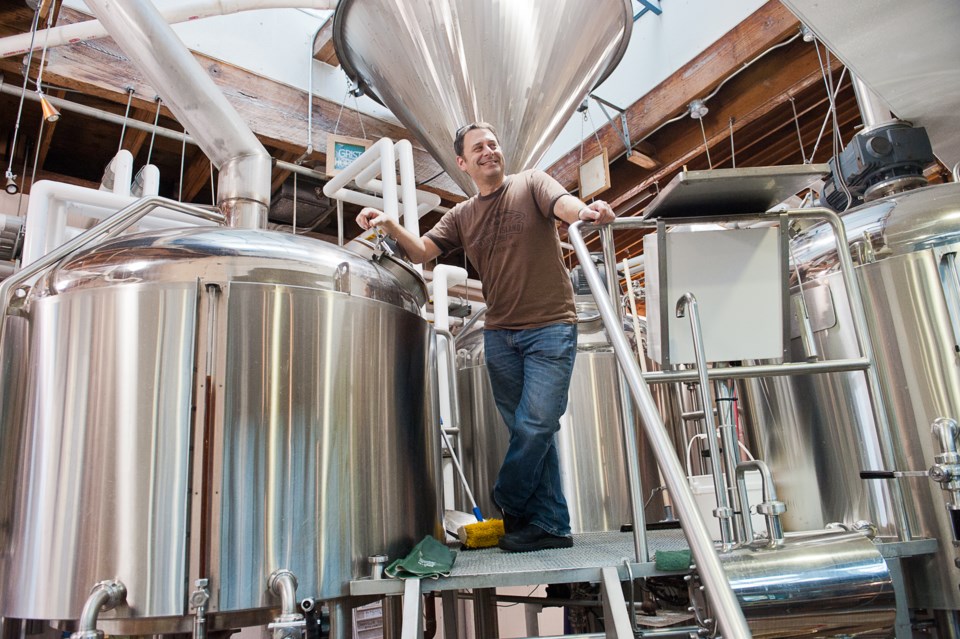It’s easy to dismiss any craft brewery that “sells out” or whatever – or is otherwise taken over by an enormous multi-national corporation – and claim, no, they’re no longer craft. It happened to Goose Island and it happened to Granville Island Brewing.
And indeed, Granville Island’s lager or pale ale doesn’t taste particularly crafty. And sure, they’re brewed in massive tanks at the Molson brewery on Burrard Street, where GIB brewmaster Vern Lambourne has some say on the brew process but is not truly in charge of the product.
Purists will say all this. I can picture the faces of at least three people I know who’ll grimace terribly at the mere thought of GIB considered craft. And, yes, GIB had to leave the BC Craft Beer Guild once Molson Coors purchased them, since the company was no longer 100 per cent owned and operated in BC.
But, as I’ve written before, the definition of craft beer is as foggy as Ozzy Osbourne’s memory, and GIB’s craft status is more complicated than you might think.
In practice, GIB – which turned 30 this year – still functions very much like a craft brewery. Last year, GIB produced 65,000 hectolitres of beer, which, by provincial standards, is technically a microbrewery. Some American craft breweries, including Sierra Nevada and Stone, produce far more than that.
More importantly, there’s a brewer at the helm able to assert creative control over everything that’s produced at GIB’s Granville Island location. There they produce small batches of beer, with taste and quality in mind. There’s a spirit of innovation and adventure inside those walls.
“I still consider [GIB] craft,” Lambourne says. “Absolutely.”
“I don’t think it matters who owns you. I mean, who owns Ferrari? Fiat. Is Ferrari still a supercar? Absolutely. I don’t think ownership has anything to do with it, and if people dug into some of the ownership structures of some of our favourite craft brewers, you’d be surprised it’s not just the guy down the street that owns it.”
He says GIB is the “great grandfather of craft beer in the province,” and in many ways, they’ve set the template for how all the craft breweries that followed would function. They subverted the norm from the get-go – they used European-style bottles when stubbies were the norm, and the beers had flavour, at a time when fizzy, light lagers dominated the market.
More significant, though, was just how instrumental GIB’s founders were in shaping federal laws that allowed microbrewies to exist as they do in the first place. It took two years prior to opening the brewery in 1984 to figure out what kind of legislation they needed in order to brew and sell beer at one location.
According to Allen Winn Sneath’s 2001 book Brewed in Canada: the Untold History of Canada’s 300 Year Old Brewing Industry, founding partner Mitch Taylor had to call on Prime Minister John Turner to strike down the old requirement to have a “public road run between the brewery and the store.”
Jamie Bennett, GIB’s brand manager, says that crusading spirit is still a core aspect of GIB’s operations. And I believe him – even if the company’s owned by an enormous corporation that has, in the past, produced some tremendously foul beer. Bennett is unrelentingly positive, an impassioned champion for the craft industry as a whole, and GIB’s place within it.
“We’re on an mission to grow craft beer. We offer the invitation to the super experimentation,” he says, in what I’m sure is for the thousandth time. “When we do that, we know that it helps everyone else in the industry and it helps everyone else as well.”
The bottom line is, GIB’s been the model for what breweries have become, and very likely what breweries could become, as the industry evolves and the macro breweries grapple with decreasing market share. It’s inconceivable that Molson Coors won’t buy more of craft breweries in the coming years.
It’s too early to tell if this’ll be good or bad. For purists, like the three people I mentioned above, it could spell a hell on earth rivaled only by nuclear fallout. But Lambourne says corporate ownership’s not that bad.
“Everybody hopes they’re going to hear of this Giant Hand of Molson that’s all-controlling,” he says, “but they really leave us alone.”
Follow this writer on Twitter @StephenSmys. You might like what you find.



